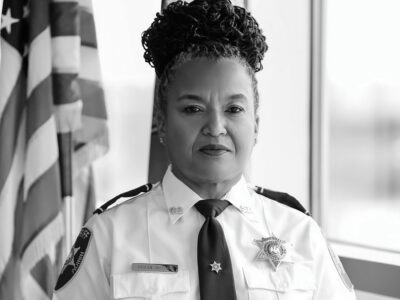
Class of ’84 | “Mrs. Lucas, have you lost your mind?” asked Judge Lynn Toler L’84 sharply in a recent episode of Divorce Court. “You want to leave this man because he cooks too often and too well and made you gain too much weight?”
She eyeballed the tearful complainant sternly before delivering her verdict: “You are a self-centered individual who doesn’t appreciate a man who loves you and doesn’t care what size you are. You need to grow up.”
Toler may have honed her legal skills in the moot-court program at Penn Law, but her commonsense approach to emotional management came courtesy of her mother, Toni—who, for the record, is less than thrilled that her daughter ditched the “serious” side of law to go to the “dark side” of a Fox reality show.
“My mom was disappointed that as the sole municipal judge [of Cleveland Heights, Ohio], I didn’t go on to become a state or federal judge,” explains Toler, whose first book is titled My Mother’s Rules: A Practical Guide (Agate Publishing, 2007), a combination memoir and self-help book that dealt with many of the issues that have come before her as a judge. “She said I had the capacity. Mom thinks [Divorce Court] is a silly show, and I get it. It’s not Masterpiece Theater, but I try to end each show with a nugget of wisdom.”
Besides, the role of TV judge suits Toler well, and she knows it.
“It’s me amped up to full volume,” she says. “It’s me at a 10.”
Infidelity is, not surprisingly, a popular subject on the show. Last year Toler interviewed disgraced evangelical pastor Ted Haggard and his wife in a two-part show, and her blunt questioning forced him to admit that he had been treated at a secular counseling center for “trauma-induced” homosexual episodes when religious counseling failed.
In another episode, a woman admitted having chased her “dog” of a spouse down the street with a bat. “He was running, dodging, ducking, and diving,” she reported to Toler—who, after warning that the woman’s anger could land her in jail, awarded her relocation costs.
The show is taped in a replicated courtroom, and while the audience reaction energizes the proceedings, it’s not all laughs. In another Divorce Court episode, Toler, herself African American, tore into a young black husband whom she believed was shirking his parental responsibilities. “Kids need to know there’s a man around providing a stable home environment,” she said sharply.
“Mom taught me how to listen to people when they’re agitated and find out how their emoting gets them into fights and other problems,” says Toler, who uses her legal-discovery tools to probe for issues “too deep for daytime”—such as the bride who slept with the best man on her wedding night.
While the show has been a good fit for Toler’s talents and personality, she says that the greatest positives for her, at first, were the short taping schedule (just 20 days a year), the minimal preparation, the deluxe treatment (five-star hotels, limousines), and the fun atmosphere. To facilitate commutes to Los Angeles, Toler moved her family from Ohio to Mesa, Arizona.
When she first took the Divorce Court bench in 2006, some viewers objected, berating her for replacing Judge Mablean Ephriam.
“She was well loved,” Toler says of her predecessor. “The press reported that producers fired her because her hair was too ‘Afro’—meaning she was too black—but she was really fired over a money dispute.”
The subject of finance is familiar to Toler, who specialized in bankruptcy and litigation at two large Cleveland law firms after earning her degree from Penn Law in 1984. Ten years after graduation she was approached to run on the Republican ticket for a municipal judgeship.
“I had a 10-month-old, four stepchildren, and my law firm wanted 60 billable hours every week,” Toler says. “I was crazed.” She campaigned door-to-door, and despite Cleveland Heights’ reputation as a Democratic Caucasian stronghold, won—in a recount, by six votes.
As a city judge, Toler says she “ran a tight ship and had few hold-over cases, which is the gauge of efficiency.” Having ruled on a variety of misdemeanors—from speeding to negligent homicide—she says that she “hated traffic court the worst,” since “people get the nastiest” in that environment.
Eight years of “high-volume households” and “mega-angry reactions” took their toll, she admits. Yet during one low period, a young woman who had been a complainant in an assault case approached her in a grocery store and told her: “You talked to us [her boyfriend and her] for a long time, and that made a difference. Things aren’t perfect, but they’re better.”
Gradually, Toler morphed into Cleveland Heights’ judicial expert on domestic violence.
“One woman was so fragile and emotionally abused, she was literally shaking,” Toler recalls. “Her husband testified that she refused to submit to his direction when he pushed her head to the dirt.”
Realizing that “incarceration without elucidation was pointless,” she introduced innovative punishments, such as reading a prescribed book and writing a report on it. Toler also tried to steer young people in the right direction before they too made bad decisions. A mentoring program she established for at-risk girls at Taylor Academy in Cleveland helped teens define goals and write contracts.
One evening a student telephoned for advice regarding a murder confession she was privy to. “I said, ‘Turn him in,’” Toler recalls.
After a profile of Toler appeared in the Cleveland Plain Dealer, Twentieth Television offered her the top spot in Power of Attorney,
a show with former O.J. Simpson prosecutors Chris Darden and Marcia Clark. The only problem was, Toler had just been re-elected judge in Cleveland Heights.
“It would have been a little embarrassing to leave the bench and get cancelled,” says Toler, who then negotiated a safety net: If the show met its demise before the end of a five-year contract, she would still receive her salary for that time period.
Which is exactly what happened. After four months, the producers pulled the plug. “It was too expensive to produce,” Toler says. “They had to pay me, the attorneys, the plaintiffs, the defendants, even the small-claims judgments up to $10,000.” No surprise that her most recent book, which she co-wrote with Deborah Hutchinson, is Put It In Writing: Creating Agreements between Family and Friends (Sterling Publishing, 2009).
In addition to appearing as an expert guest on shows hosted by the likes of Dr. Phil, Tyra Banks, Rachael Ray, Larry King, and Montel Williams, Toler has had numerous speaking engagements around the country on domestic violence, black youth, and relationships. She also writes a column for Divorce Magazine, which bills itself as “the Internet’s leading divorce and separation resource site”; has been named one of the Cleveland Bar Association’s Ten Outstanding Women in the Law; and last year was given the Freedom Award by the Philadelphia Chapter of the Martin Luther King Association for Nonviolence.
Having recently served as executive producer for Wedlock or Deadlock, a Divorce Court spin-off that tested well in several cities but never caught on, Toler admits that she would like to create more TV shows. So stay tuned.
—Janice Arenofsky




